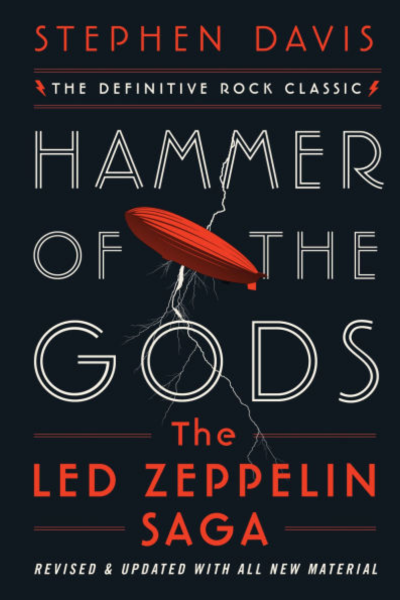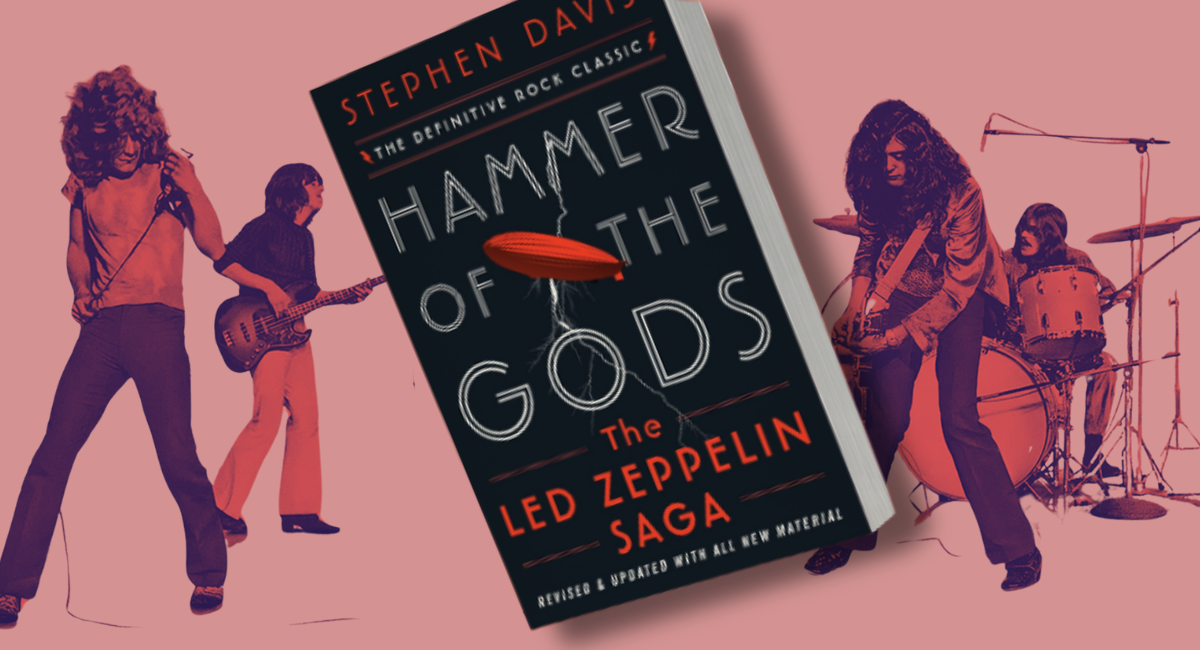The Return of a Rock Bible: As Subtle as a Jackhammer in a Library
There are music books that inform, those that inspire and then there’s Hammer of the Gods – a literary Molotov cocktail hurled directly at the face of rock history. Stephen Davis’s notorious biography of Led Zeppelin is back in 2024 with a spruced-up edition, presumably because the world needed to be reminded that, once upon a time, music wasn’t piped through TikTok filters but blasted through hotel walls by half-naked men riding sharks.
First published in 1985, Hammer of the Gods has been called everything from “essential” to “a libellous fever dream.” This new edition attempts to wrangle the chaos with updated material, context and maybe a little guilt. Spoiler: it’s still gloriously deranged.
Table of Contents

Led Zeppelin: A Symphony of Excess
Led Zeppelin weren’t just a band. They were a force of nature. A Viking horde in bell-bottoms. Four men who pioneered heavy metal and groupie-based mythology in equal measure. Robert Plant: golden-haired banshee. Jimmy Page: guitar wizard and possible warlock. John Paul Jones: the quiet genius. John Bonham: a thunder god who once drank 40 shots of vodka and called it foreplay.
Stephen Davis charts their meteoric rise, from sweaty pub gigs to stadium domination, with the kind of breathless glee usually reserved for crime scene investigators or war correspondents. And rightly so. Zeppelin weren’t just making music – they were redefining what it meant to be rock stars and depending on your perspective, either inventing or perfecting the art of being absolute monsters on tour.
What’s New in the 2024 Edition?
So, what’s the big deal with this rebooted version? Why fork out your beer money for a book that’s been around longer than some of your teeth?
The 2024 edition updates the original with fresh interviews, reflective commentary and new context around some of the wilder allegations. In other words, Davis gets a little more “grown-up,” but not too much – don’t worry, the shark story’s still in there.
The new material examines Zeppelin’s legacy in the streaming age, revisits the impact of #MeToo on how we view their antics (awkward!), and attempts to square the genius of their music with the sometimes reprehensible behaviour that surrounded it.
Spoiler alert: it’s still mostly about sex, drugs and hotels that never stood a chance.
Sex, Drugs and Structural Damage
The book’s title is a nod to Norse mythology, Zeppelin liked to imagine themselves as musical gods smiting the unworthy. And fair enough, they played like deities. But they partied like toddlers on bath salts.
Highlights of the band’s excesses include:
- Entire hotel floors destroyed in a single night (bonus points if the damage involved fire or food fights).
- Groupie “adventures” that read like Hunter S. Thompson ghostwrote Fifty Shades of Grey.
- Jimmy Page allegedly kidnapping a 14-year-old groupie and calling it romance (this aged poorly, even by rock standards).
- John Bonham drinking like he was actively trying to end the Cold War via cirrhosis.
Davis doesn’t just recount these tales – he practically cackles through them. If you’re looking for a sober reflection on artistry and legacy, look elsewhere. This is Trainspotting with guitars.
Music Amid the Mayhem
Buried beneath the orgies, occult dabbling and occasional public nudity is the actual music. And yes, it’s worth remembering: Led Zeppelin didn’t just invent stadium rock – they elevated it to religious ecstasy.
Davis is clearly in awe of their talent. He dives into their songwriting process, the layering of tracks like “Kashmir” and “Stairway to Heaven,” and how they pushed the boundaries of blues, folk and sheer volume. The band’s refusal to release singles in the U.S. (because albums were “the real art”) is portrayed as both arrogant and genius. Which is sort of their entire vibe.
If you’re a music nerd, there’s plenty here to feast on. Just be prepared for the meal to come served on a hotel-room floor, next to a passed-out groupie and a flaming television set.
The Morality Hangover
In 2024, reading Hammer of the Gods is like bingeing an old sitcom and suddenly realising everyone’s casually sexist, racist, or both. There’s a creeping discomfort that settles in around the third tale of “boys being boys” in ways that would get most modern musicians cancelled faster than you can say “Spotify apology video.”
Davis acknowledges this, kind of. The new material attempts some light reckoning, but ultimately, the book is more interested in preserving the mythology than unpacking its implications.
And maybe that’s okay. Or maybe it’s massively problematic. Either way, it makes for compulsive reading.
Stephen Davis: Rock’s Chief Archaeologist or Gossip Fiend?
Let’s be clear: Davis didn’t write this book from a safe distance. He was there. Not always in the room, but in the orbit—sniffing out stories, chasing leads and possibly raiding bins for lyric scraps. His tone straddles the line between adoration and tabloid sensationalism. You can practically hear him giggle as he types another tale of debauchery.
This makes the book wildly entertaining, but it also leaves room for exaggeration. Some stories have been denied, others confirmed and many exist in the foggy middle ground of “Yeah, sounds about right.”
Davis isn’t a perfect biographer. But he is the right one for a band that lived like fictional characters in a Bret Easton Ellis novel.
Should You Read It?
Let’s be honest: you already know if this is your cup of whiskey-laced tea.
Read if:
- You worshipped Physical Graffiti like it was scripture
- You enjoy music history spiked with gossip and gore
- You want to understand the madness behind the magic
- You’re sick of sterilised Spotify bios and long for the chaos
Avoid if:
- You think “problematic” is a four-letter word
- You enjoy quiet, dignified portrayals of artists
- You’re currently in recovery and would rather not relapse via prose
Final Thoughts: Gods, Monsters, or Just Men with Guitars?
Hammer of the Gods is not a gentle book. It doesn’t ask for forgiveness. It doesn’t traffic in nuance. It simply barrels through the history of one of the greatest (and worst-behaved) bands of all time, leaving scorched earth and questionable moral lessons in its wake.
The 2024 edition adds some polish, a hint of reflection and just enough context to remind you that yes, this really happened. And no, you probably wouldn’t want it to happen again.
But damn, what a ride.

Hammer of the Gods
The gold-standard biography of the band Led Zeppelin—revised and updated with new material for fans of the band and this beloved rock classic.
“One of the most notorious rock biographies ever written.” —Chicago Tribune
The members of Led Zeppelin are major deities in the pantheon of rock gods. The first and heaviest of the heavy metal monsters, they violently shook the foundations of rock music and took no prisoners on the road. Their tours were legendary, their lives were exalted, and their music transcendent. No band ever flew as high as Led Zeppelin or suffered so disastrous a fall. And only some of them lived to tell the tale.
Originally published in 1985, and last updated in 2008, Hammer of the Gods is considered the ultimate word on Led Zeppelin, and a definitive rock and roll classic that captures the first heavy metal monsters in all their excessive glory. With new material from bestselling biographer Stephen Davis this edition includes the story of their legendary one-night-only reunion in 2007 and the post-Zeppelin work of each member, especially Robert Plant’s Grammy-winning collaborations with Alison Krauss. An up-to-date discography brings this New York Times bestseller fully to the present, and will captivate a new generation of music fans, Zeppelin fans, and readers.
3 More Rock Biographies That Slap You in the Face
Life by Keith Richards
Imagine Hammer of the Gods but from someone who survived it. Richards remembers everything, probably because his bloodstream is 80% formaldehyde.
Beastie Boys Book by Michael Diamond & Adam Horovitz
Witty, poignant, and less likely to make you Google “statutory laws in the 70s.”
Heavier Than Heaven by Charles R. Cross
A gripping and tragic look at Kurt Cobain. If Zeppelin were gods, Cobain was a martyr. Less sex, more sadness.















